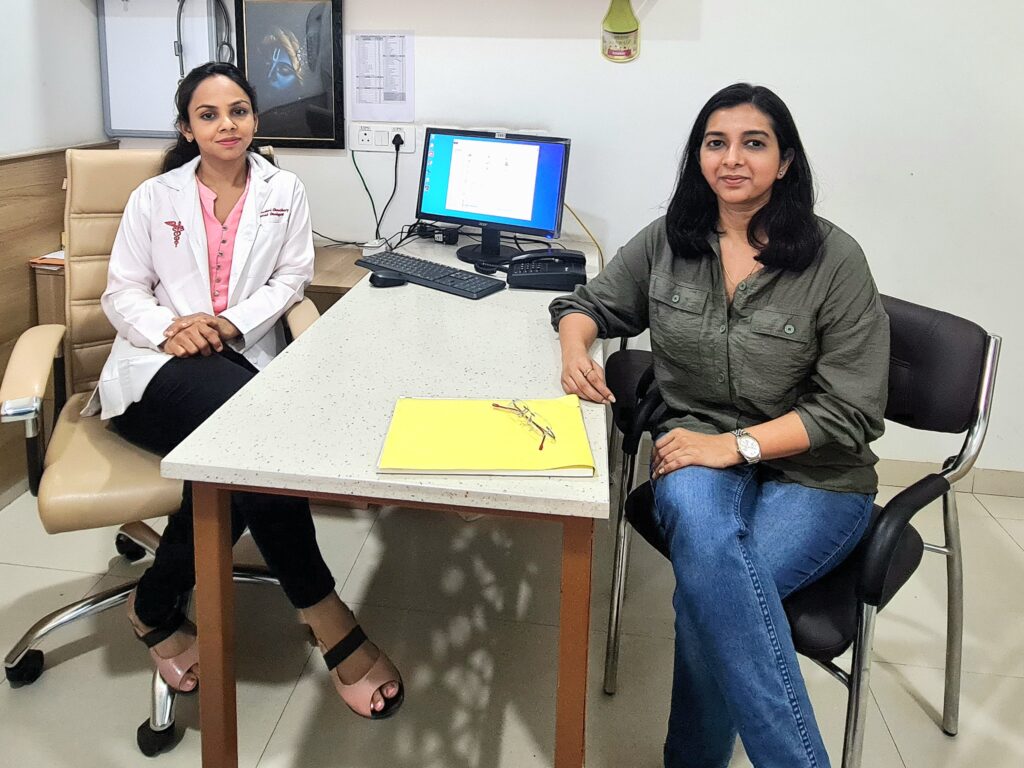A Conversation between Dr. Neha Vegad and Dr. Yashashvi Choudhary
Dr. Yashashvi Choudhary, the first oncologist in Mathura, with experience of more than 1000 surgeries in past 8 years. She is currently working at CIMS Hospital, Mathura. She recently completed a prestigious fellowship at the National Cancer Institute in Milan, Italy. In recognition of her inspiring work, she has been honored with the Yuva Nari Shakti (Young Women Empowerment) award by Dainik Jagran.
Dr. Neha: First of all, congratulations for receiving the Yuva Nari Shakti Award! Can you tell us what inspired you to specialize in oncology?
Dr. Yashashvi: Thank you so much, Neha. The seed was planted during my medical training in 2013. I observed that cancer patients had extremely limited access to care. There was only one oncologist visiting once a week, handling 100 patients in a day and long waiting list for surgeries. Witnessing this painful reality compelled me to pursue surgical oncology and fill that gap.
Dr. Neha: That’s powerful. We’ve been hearing that cancer cases are rising rapidly. Why is this happening?
Dr. Yashashvi: You’re absolutely right. According to WHO, global cancer cases will rise by 77% by 2050. In India, this surge is due to lifestyle changes, poor dietary habits, food adulteration (eg. dairy & bread) , air and water pollution, excessive use of pesticides, and increasing alcohol and tobacco consumption.
Dr. Neha: What makes India particularly vulnerable in this scenario?
Dr. Yashashvi: Two major factors. First, most patients come for treatment in very advanced stages—70 to 75% are diagnosed late. Second, cancers in India are striking much earlier. Globally, half of the cancer burden was seen in above 65 years age group, while it is in the 40-64 years age group in India.
Dr. Neha: That’s alarming. Apart from tobacco and alcohol, what other hidden contributors do you see?
Dr. Yashashvi: Yes, even non-smokers and non-drinkers aren’t safe. We are surrounded by toxins—harmful coloring agents / preservatives (even in baby foods artificial sweeteners are used) used in food, artificial ripening agents, adulteration in food (analogue paneer), microplastics in water, and uncontrolled use of pesticides like DDT etc (which are banned in other countries). The lack of strict regulations allows these carcinogens to enter our everyday lives.
Dr. Neha: Is the Indian healthcare system equipped to handle this cancer burden?
Dr. Yashashvi: We’ve made progress, but gaps remain—limited radiation therapy units, overburdened staff, and a general lack of awareness. Many patients delay diagnosis because they fear the label of “cancer.” Some even reject necessary tests like biopsy and take non recommended treatments from quacks. This delay makes cure much more difficult.
Dr. Neha: What role does screening play in managing cancer?
Dr. Yashashvi: A huge one. Countries like Japan and South Korea have successfully reduced cancer deaths by implementing regular screenings, which are often covered by insurance. In India, we need to push for the same—screening is the gateway to early detection, which improves survival rates dramatically.
Dr. Neha: Are there any vaccines available that help prevent cancer?
Dr. Yashashvi: Absolutely. The cervical cancer vaccine is 99% effective and now more affordable thanks to India’s indigenous version, CERVAVAC, priced around ₹2000 for girls under 16, while imported one cost Rs.10000. We also have the Hepatitis B vaccine, which helps prevent liver cancer. Research on cancer treatment vaccines is underway, but they’re currently expensive and still experimental.
Dr. Neha: Can lifestyle changes really make a difference in preventing cancer?
Dr. Yashashvi: Definitely. Nearly 40% cancers are preventable if you follow advices given by doctors. A sedentary lifestyle, processed foods, addictions to tobacco/alcohol increase the risk. The American Cancer Society recommends 300 min. physical activity in a week and a 2/3rd of your meal should include fruits, pulses and vegetables. These simple choices can reduce cancer risk by up to 40%.
Dr. Neha: Coming to our main question: Can Regular Health Check-Ups Prevent Cancer?
Dr. Yashashvi: While they don’t prevent cancer, they help catch it early—when it’s found in early stage, its is completely curable. For individuals above the age of 40, certain screening tests are recommended:
- Breast cancer: Women should undergo yearly mammograms.
- Oral cancer: Men who smoke or use tobacco products should have regular oral screening.
- Lung cancer: Depending on smoking history, a chest CT scan may be advised.
- Prostate cancer: Screening through PSA (Prostate-Specific Antigen) levels.
- Cervical Cancer: PAP smear / HPV testing
- Abdominal ultrasound to detect any mass in abdomen
These can save lives.
Dr. Neha: And finally, what message would you like to share with families and the younger generation?
Dr. Yashashvi: Don’t ignore symptoms or delay medical advice. Cancer doesn’t develop because of tests—it’s already there. Early diagnosis and treatment can cure cancer completely. Talk openly, trust your doctors, and prioritize your health. You’re not just saving yourself—you’re saving your family from trauma too.

